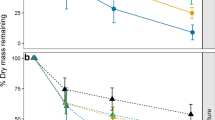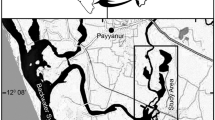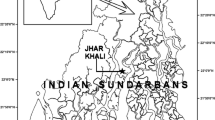Abstract
Decomposition of Rhizophora apiculata, Rhizophora mucronata, Bruguiera parviflora and Sonneratia alba leaves was studied in situ using litter bags in both Cleared and Virgin Jungle Reserve (VJR) mangrove forests in Peninsular Malaysia. A single exponential model best described the rate of decomposition for each species. All leaf species decomposed faster in the VJR site than in the Cleared site (R. apiculata P <0.05, R. mucronata P <0.01, B. parviflora P <0.01, S. alba not significant and mixed bags P <0.05). The rate of decomposition was species specific: Sonneratia alba leaves decomposed the fastest (P <0.001) in both sites. The time in days required for the loss of half the initial dry mass (t 50) was Cleared site: R. apiculata 76, R. mucronata 122, B. parviflora 122, S. alba 22, mixed 51; VJR: R. apiculata 43, R. mucronata 34, B. parviflora 70, S. alba 15 and mixed 32. Increasing litter diversity, by mixing leaves of different species in bags, had no effect on decomposition rate. The mass of air controls showed an initial decline to 65% in 14 d but then remained fairly constant (t 50=108 d). This initial loss may represent the leaching of dissolved organic matter. Water controls (mixed litter bags submerged in seawater) had a t 50 of 10 d, a rate significantly different (P < 0.01) from air controls. Our results show that breakdown of leaf litter is site and species dependent. This affects ecological functioning of the mangrove ecosystem and may have implications for management and conservation of mangroves.
Similar content being viewed by others
References
Aksornkoae, S., 1986. Mangrove ecosystem general background. In: Training Course on Life History of Selected Species of Flora and Fauna in Mangrove Ecosystems. UNDP/UNESCO Regional Project (RAS/86/120): 17–23.
Alongi, D. M., A. Sasekumar, F. Tirendi & P. Dixon, 1998. The influence of stand age on benthic decomposition and recycling of organic matter in managed mangrove forests of Malaysia. J. exp. mar. Biol. Ecol. 225: 197–218.
Ashton, E. C., 1999. Biodiversity in Two Managed Mangrove Forests in Peninsular Malaysia. Doctoral thesis, University of York: 411 pp.
Basaguren, A. & J. Pozo, 1994. Leaf litter processing of alder and eucalyptus in the Aguera stream system (Northern Spain) II Macroinvertebrates associated. Arch. Hydrobiol. 132: 57–68.
Boonruang, P., 1978. The degradation rates of mangrove leaves of Rhizophora apiculata (Bl.) and Avicennia marina (Forsk.) Vierh. at Phuket Island, Thailand. Research Bulletin No. 26. Phuket Marine Biological Centre, Thailand: 7.
Bunt, J. S., K. G. Boto & G. Boto, 1979. A survey method for estimating potential levels of mangrove forest primary production. Mar. Biol. 52: 123–128.
Camilleri, J. C., 1982. Leaf-litter processing by invertebrates in a mangrove forest in Queensland. Mar. Biol. 114: 139–145.
Camilleri, J. C. & G. Ribi, 1986. Leaching of dissolved organic carbon (DOC) from dead leaves, formation of flakes of DOC and feeding on flakes by crustaceans in mangroves. Mar. Biol. 91: 337–344.
Cintron, G. & Y. S. Schaeffer-Novelli, 1984. Methods for studying mangrove structure. In: Snedaker, S. C. & J. C. Snedaker (eds), The Mangrove Ecosystem: Research Methods. UNESCO, Paris: 91–113.
Cundell, A. M., M. S. Brown, R. Stanford & R. Mitchell, 1979. Microbial degradation of Rhizophora mangle leaves immersed in the sea. Estuar. coast. Mar. Sci. 9: 281–286.
English, S., C. Wilkinson & V. Baker (eds), 1994. Survey Manual for Tropical Marine Resources. Australian Institute of Marine Science, Townsville, Australia: 119–196.
Fell, J. W., R. C. Cefalu, I. M. Masters & A. S. Tallman, 1975. Microbial activity in the mangrove (Rhizophora mangle) leaf detritus system. In Walsh, G. E., S. C. Snedaker & H. J. Teas (eds), Proc. Int. Symp. Biology and Management of Mangroves, Honolulu, 1974, vol II. University of Florida, Gainesville Florida: 23–42.
Gan, B. K., 1995. A working plan for the Matang mangrove forests Perak (fourth revision). Published by the State Forest Department of Perak Darul Ridzuan, Malaysia: 214.
Gee, J. M. & P. J. Somerfield, 1997. Do mangrove diversity and leaf litter decay promote meiofaunal diversity? J. exp. mar. Biol. Ecol. 218: 13–33.
Golley, F., H. T. Odum & R. F. Wilson, 1962. The structure and metabolism of a Puerto Rico mangrove forest in May. Ecology 43: 9–19.
Gong, W. K. & J. E. Ong, 1995. The use of demographic studies in mangrove silviculture. Hydrobiologia 295: 255–261.
Gong, W. K., J. E. Ong, C. H. Wong & G. Dhanarajan, 1984. Productivity of mangrove trees and its significance in a managed mangrove ecosystem in Malaysia. In Soepadmo, E., A. N. Rao & D. J. Macintosh (eds), Proc. UNESCO As. Symp. Mangr. Env.-Res and Manag. University Malaya, Malaysia: 216–225.
Haron, H. A. H., 1981. A working plan for the second 30-year rotation of the Matang Mangrove Forest Reserve Perak, the first 10-year period 1980–1989. State Forestry Department, Perak: 115.
Hooper, D. U. & P. M. Vitousek, 1998. Effects of plant composition and diversity on nutrient cycling. Ecol. Mono 68: 121–149.
Jolliffe, P. A., 1997. Are mixed populations of plant species more productive than pure stands? Oikos 80: 595–606.
Lee, S. Y., 1995. Mangrove outwelling: a review. Hydrobiologia 295: 203–212.
Lu, C. & P. Lin, 1990. Studies on litter fall and decomposition of Bruguiera sexangula (Lour.) Poir, community on Hainan Island, China. Bull. Mar. Sci. 47: 139–148.
Mackey, A. P. & G. Smail, 1996. The decomposition of mangrove litter in a subtropical mangrove forest. Hydrobiologia 332: 93–98.
Mall, L. P., V. P. Singh & A. Garge, 1991. Study of biomass, litterfall, litter decomposition and soil respiration in monogeneric and mixed mangrove forests of Andaman Islands. Trop. Ecol. 32: 144–152.
McNaughton, S. J., 1993. Biodiversity and function of grazing ecosystems. In Schulze, E. D. & H. A. Mooney (eds), Biodiversity and Ecosystem Function. Springer, Berlin: 361–383.
Naeem, S. & S. Li, 1997. Biodiversity enhances ecosystem reliability. Nature 390: 507–509.
Naeem, S., L. Thompson, S. Lawler, J. H. Lawton & R. M. Woodfin, 1994. Declining biodiversity can alter the performance of ecosystems. Nature 368: 734–737.
Neilson, M. J. & G. N. Richards, 1989. Chemical composition of degrading mangrove leaf litter and changes produced after consumption by mangrove crab Neosarmatium smithii (Crustacea: Decapoda: Sesarmidae). J. Chem. Ecol. 15: 1267–1283.
Neilson, M. J., R. L. Giddins & G. N. Richards, 1986. Effects of tannins on the palatibility of mangrove leaves in the tropical sesarmid crab Neosarmatium smithii (Crustacea: Decapoda: Sesarmidae). Mar. Ecol. Prog. Ser. 34: 185–186.
Newell, S. Y., J.W. Fell, A. Statzell-Tallman, C. Miller & R. Cefalu, 1984. Carbon and nitrogen dynamics in decomposing leaves of three coastal marine vascular plants of the subtropics. Aquat. Bot. 19: 183–192.
Odum, W. E. & E. J. Heald, 1975. The detritus-based food web of an estuarine mangrove community. In Cronin, L. E. (ed.), Estuarine Research. Academic Press, New York: 265–286.
Ong, J. E., 1995. The ecology of mangrove conservation and management. Hydrobiologia 295: 343–351.
Ong, J. E., W. K. Gong, C. H. Wong & G. Dhanarajan, 1984. Contribution of aquatic productivity in managed mangrove ecosystem in Malaysia. In Soepadmo, E., A. N. Rao & D. J. Macintosh (eds), Proc. UNESCO As. Symp. Mangr. Env.-Res and Manag. University Malaya, Malaysia: 209–215.
Poovachiranon, S., K. Boto & N. Duke, 1986. Food preference studies and ingestion rate measurements of the mangrove amphipod Parhyale hawaiensis. J. exp. mar. Biol. Ecol. 98: 129–140.
Rao, R. G., A. F. Woitchik, L. Goeyens, A. Vanriet, J. Kazungu & F. Dehairs, 1994. Carbon, nitrogen contents and stable carbonisotope abundance in mangrove leaves from an East-African coastal lagoon (Kenya). Aquat. Bot. 47: 175–183.
Rice, D. L. & K. R. Tenore, 1981. Dynamics of carbon and nitrogen during the decomposition of detritus derived from estuarine macrophytes. Estuar. coast. shelf Sci. 13: 681–690.
Robertson, A. I., 1988. Decomposition of mangrove leaf litter in tropical Australia. J. exp. mar. Biol. Ecol. 116: 235–247.
Robertson, A. I., D. M. Alongi & K. G. Boto, 1992. Food chains and carbon fluxes. In Robertson, A. I. & D. M. Alongi (eds), Tropical Mangrove Ecosystems. American Geophysical Union, Washington, DC: 293–326.
Schleyer, M. H., 1986. Decomposition in estuarine ecosystems. J. Limnol. Soc. South Afr. 12: 90–98.
Snedaker, S. C. & J. G. Snedaker (eds), 1984. The Mangrove Ecosystem: Research Methods. Monographs on oceanographic methodology 8. UNESCO, Paris: 251.
Spalding, M. D., F. Blasco & C. D. Field (eds), 1997. World Mangrove Atlas. The International Society for Mangrove Ecosystems, Okinawa, Japan: 178.
Steinke, T. D., A. D. Barnabas & R. Samuru, 1990. Structural changes and associated microbial activity accompanying decomposition of mangrove leaves in Mgeni Estuary. S. Afr. J. Bot. 56: 39–48.
Steinke, T. D., G. Naidoo & L. M. Charles, 1983. Degradation of mangrove leaf and stem tissues in situ in mgeni Estuary, South Africa. In Teas, H. J. (ed.). Tasks for Vegetation Science 8. Dr W. Junk Publishers, The Hague: 141–149.
Steinke, T. D., A. J. Holland & Y. Singh, 1993a. Leaching losses during decomposition of mangrove leaf litter. S. Afr. J. Bot. 59: 21–25.
Steinke, T. D., A. Rajh & A. J. Holland, 1993b. The feeding behaviour of the red mangrove crab Sesarma meinerti De Man, 1887 (Crustacea: Decapoda: Grapsidae) and its effect on the degradation of mangrove leaf litter. S. Afr. J. Mar. Sci. 13: 151–160.
Stewart, B. A. & B. R. Davies, 1989. The influence of different litterbag designs on the breakdown of leaf material in a small mountain stream. Hydrobiologia 183: 173–177.
Tam, N. F. Y., L. L. P. Vrijmoed & Y. S. Wong, 1990. Nutrient dynamics associated with leaf decomposition in a small subtropical mangrove community in Hong Kong. Bull. Mar. Sci. 47: 68–78.
Tam, N. F. Y., Y. S. Wong, C. Y. Lan & L. N. Wang, 1998. Litter production and decomposition in a subtropical mangrove swamp receiving wastewater. J. exp. mar. Biol. Ecol. 226: 1–18.
Tietjen, J. H. & D. M. Alongi, 1990. Population growth and effects of nematodes on nutrient regeneration and bacteria associated with mangrove detritus from northeastern Queensland (Australia). Mar. Ecol. Prog. Ser. 68: 169–179.
Tilman, D., D. Wedin & J. Knops, 1996. Productivity and sustainability influenced by biodiversity in grassland ecosystems. Nature 379: 718–720.
Twilley, R. R., M. Pozo, V. H. Garcia, V.H. Rivera-Monroy, R. Zambrano & A. Bodero, 1997. Litter dynamics in riverine mangrove forests in the Guayas River estuary, Ecuador. Oecologia 111: 109–122.
Van der Valk, A. G. & P. M. Attiwill, 1984. Decomposition of leaf and root litter of Avicennia marina at Westernport Bay, Victoria, Australia. Aquat. Bot. 18: 205–221.
Wafar, S., A. G. Untawale & M. Wafar, 1997. Litterfall and energy flux in a mangrove ecosystem. Estuar. coast. shelf Sci. 44: 111–124.
Wardle, D. A., K. I. Bonner & K. S. Nicholson, 1997. Biodiversity and plant litter: experimental evidence which does not support the view that enhanced species richness improves ecosystem function. Oikos 79: 247–258.
Watson, J. G., 1928. Mangrove forests of the Malay Peninsula. Malayan Forest Records No. 6: 1–275.
Wieder, R. K. & G. E. Lang, 1982. A critique of the analytical methods used in examining decomposition data obtained from litter bags. Ecology 63: 1636–1642.
Author information
Authors and Affiliations
Rights and permissions
About this article
Cite this article
Ashton, E.C., Hogarth, P.J. & Ormond, R. Breakdown of mangrove leaf litter in a managed mangrove forest in Peninsular Malaysia . Hydrobiologia 413, 77–88 (1999). https://doi.org/10.1023/A:1003842910811
Issue Date:
DOI: https://doi.org/10.1023/A:1003842910811




